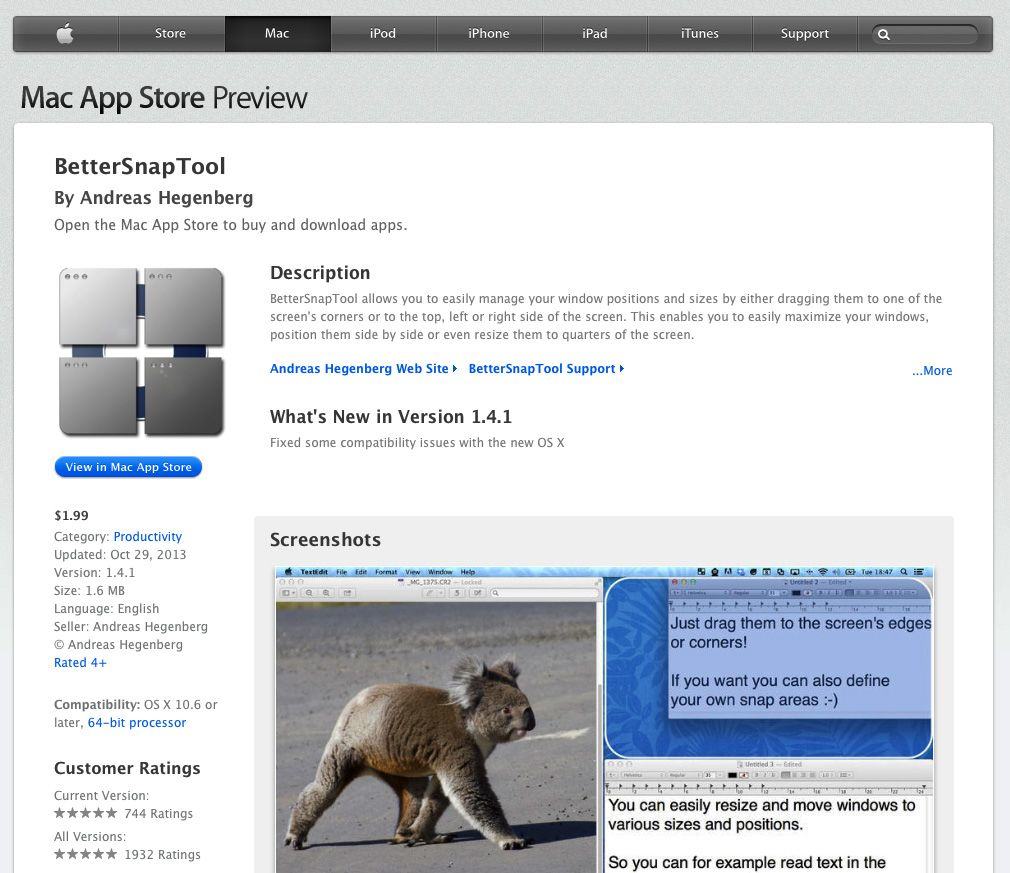The iOS App Store gold rush might be played out for all but the luckiest developers, but there’s another part of the Apple empire where coders can find breakout success: the Mac App Store.
“Compared to iOS, it’s definitely easier to have a hit in the Mac App Store,” says Andreas Hegenberg, the creator of successful gesture-based Mac app BetterTouchTool. “I think it’s still pretty easy to develop a Mac App Store app that can feed you very well. But it all depends on how you define a ‘big hit.'”
While games rule the increasingly cluttered roost in the iOS store — with many unimaginative developers looking to get rich quick with yet another Flappy Bird clone — the Mac App Store is home to more pedestrian offerings like accounting software and productivity tools.
The Mac App Store might not mint a new millionaire each day, but the developers we spoke with said writing this type of bread-and-butter software can provide a reliable source of income. Here’s why.
You’re a big fish in a small pond
The iOS App Store houses 55 times more apps than the Mac App Store. In cold hard numbers, this breaks down to a reasonable 19,758 Mac apps versus an astonishingly massive 1,101,746 for iOS.
As a result, it’s much easier to achieve visibility in the Mac App Store. To put this into context, the last time the iOS App Store held only 19,758 apps was February 2009 — less than a year after the iPhone was made available to developers.
“It’s definitely easier to get exposure for a Mac app, because ranking in the Paid Top 25 chart in any particular country only requires a few dozen downloads,” says Rishi Modha, director of FIPLAB, one of the largest developers in the Mac App Store. “You don’t need to have a huge marketing budget to at least get your app ranking high for a few days.”
“I never invested a penny into marketing BetterSnapTool or my other apps,” agrees Hegenberg. “The only marketing instruments I used were my blog and the release notes of my free apps.”
However, making it is not always easy.
“These big hits are hard to get,” says developer Christopher Atlan — “whether it’s iOS or the Mac App Store, [it’s like] Hollywood or Broadway.”
The comparison works well. When we’re talking about earnings, there are very few Hollywood A-listers raking in the millions, but there are certainly plenty of more-than-comfortable Broadway regulars.
“I doubt there are more than a handful of Mac developers making more than $2,000 a day,” says Modha. “On iOS, there are probably thousands of developers who hit that milestone and dozens who are earning far more than that amount.”
But while the upper limit for earnings as a Mac app developer may be lower, so too are the barriers to making a full-time living. Like starting a movie website in 1993 — when you were very likely to be the only person doing it — developing for the Mac App Store means you’re not going to be one of hundreds (or thousands) of people offering near-identical products.
Consistency is everything
One of the things that made Steve Jobs great was that he was consistent with his innovations. Had he only created the Macintosh or the iPod or the iPhone, he would have been regarded as a visionary — but also as a one-hit wonder. Instead he created one insanely great product after another, garnering a reputation as a reliable hitmaker in the process.
As a Mac app developer, you might not become the next Steve Jobs, but at least you can earn a consistent living. As exciting as iOS’s ramen-to-riches promise is, fortunes can fall as fast as they rise. And many apps languish in obscurity.
“On the iOS platform, a big hit can easily be a fad that ranks in the Top 10 chart for a week, makes a fortune, then disappears,” says Modha. “A big hit on the Mac App Store is more likely to be achieved through an app that ranks well on the charts for a period of several months.”
This has a lot to do with the kind of apps that become popular. The iOS App Store is overrun with games but the Mac App Store tends to be dominated by productivity apps. Because these tools address a genuine work need, they tend to have longer lifespans than games. Another plus: Your daily bread doesn’t depend on fickle teens.

The pricing system is favorable to developers
If you want to participate in the cutthroat world of iOS development, you must prepare to be reactive. If you create a popular app, get ready for a wave of copycats taking your idea and charging users less for it. Competitive pricing also means it’s hard to ramp up the cost of your app if you suddenly decide you’ve got a great idea that’s going to need some extra development funds.
Things move a little bit slower in Mac app land.
“When it comes to Mac apps, we have found that users seem to be more willing to pay higher prices,” Modha says. “Raising prices by a few dollars doesn’t have a huge impact on sales volume on the Mac App Store. This is in stark contrast to the iOS App Store, where if you increased the price of a 99-cent app to $2.99, it would probably have a devastating effect on its sales and ranking.”
The Mac App Store also has a few more options available in pricing. Where iOS is overrun with in-app-purchases (which make money for developers, but also promote short-term app engagement), Mac app developers can create multiple versions of their apps at different price points. Some opt to create “lite” version of their apps, which they sell through the Mac App Store — along with more comprehensive “pro” versions sold through their websites, where they won’t have to pay Apple its cut. Christopher Atlan says he sells a $6.99 version of his email plugin Letter Opener in the Mac App Store, and a $29.95 Letter Opener Pro through his website.
If you’re a developer or a wannabe developer looking to fill a niche, the Mac App Store might be a better bet — particularly if you’re looking to carve out a career rather than strike it lucky once. The history of Apple is all about flouting conventional wisdom, and going where the crowds aren’t in order to break new ground.
Next time you read a story about the new Flappy Bird, or whatever the next breakout hit is on iOS, remember to think different. It will pay off.


